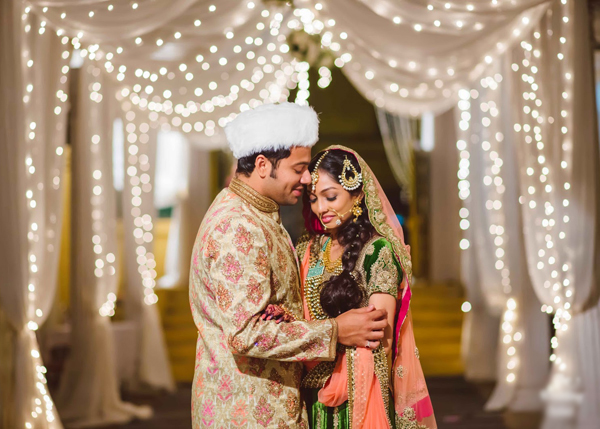In Muslim matrimony, traditions dictate the steps that must be followed until the big day arrives.
Muslim weddings consist of celebrations of several days in which the bride is the true protagonist of the event. Muslim weddings include rooms full of bright colors, fresh flowers to honor the future couple and a lot of traditions. If this season, you are going to attend your first Muslim wedding and want to go there fully informed, here is the simplest guide to avoid surprises!
Muslim weddings are celebrated in a mosque before the Imam. The tradition, extended to other cultures and religions, indicates that all preparations of the bride on the day of the wedding, such as dress or accessories, should not be seen by the groom before the wedding ceremony, as it brings bad luck. This religion allows men to marry Christian or Jewish women because they represent people who have a sacred book, but instead, Muslim women should not marry someone who does not belong to their religion.
The marriage contract must be certified by the groom and his guardian named Wali. In the official act of marriage, in which religious scriptures are read (as in most ceremonies), the Wali pronounces a few words dedicated to the couple. As in other religions, all the provisions and laws (including those of the marriage) are found in the holy book, Quran.
In the Muslim religion, it is allowed to have more than one wife, although the most common practice is to have only one wife. The same thing happens with the negotiation of marriage. Formerly, it was customary that two men, the fiancé and a male relative close to the bride (father or brothers), closed the marriage agreement. However today, it is something agreed to between the couple.
The traditional dowry is far from what we are used to believing. It is interpreted to be a gift from the groom’s family to the bride’s when in reality, it is a gift from the future husband to his wife, such as, the engagement ring, earrings or the house in which they will live in once married to start with their matrimonial life.
The couple presents themselves with three witnesses before the “sheik,” a type of Islamic magistrate, to perform the marriage contract. Under Islamic law, at that time, the couple is legally and spiritually united, although the wedding ceremony has not yet been held. Therefore, the bride returns to her house to plan the celebration, which is usually carried out one or two weeks later. A Muslim wedding usually lasts three days to a week and is usually celebrated in the home of one of the parties, or as in other religions, in public places such as hotels, farms, etc.
The first night is a celebration only for the women. The bride dresses with a kaftan, and her hands and feet are marked with henna to ward off the evil spirits. Each symbol has a meaning allusive to women and men. In addition, the bride also enjoys a Hammam, a relaxing bath with steam to purify herself. That night, the bride is escorted by the women with candles, incense, songs and dances that allude to her beauty. The mother-in-law of the bride gives her a tray with keys, bread, and milk. The keys represent the welcome to the family and the food signify the abundance. A Muslim wedding symbolizes the union of families more than that of the bride and groom. Hence, the importance of giving gifts to families is self-explanatory.
From the second night, the party begins to which family and friends are invited. In all the celebrations, there is a rich Muslim tradition and its beautiful folklore in which the bride and groom take the place of honor at the banquet.
Now that you know the Muslim customs and all the ancestral mystery that they entail, you only need to let yourself be carried away by their spell and enjoy the wedding! If you are also looking for a Muslim bride or groom for yourself, try your luck at Muslim matrimonial sites or Muslim matrimony sites. If lucky, finding your soulmate through these matrimonial sites could be a cake walk!


